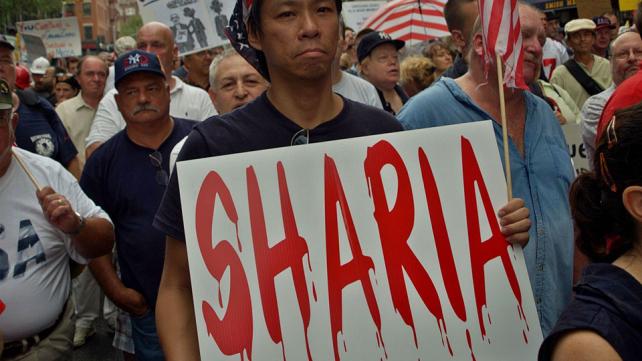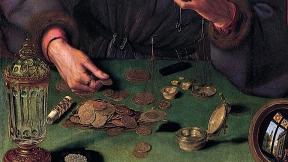
We have all seen the word Sharia written in red-blood-dripping-fonts accompanied by an image of clouds of smoke emanating from a half destroyed building.
We are witnessing anti-Sharia protests across the United States fueled by emotional chants demanding a ban on “draconian laws” creeping into our country.
We are being bombarded with Islamophobic rhetoric voiced by politicians and preached by fringe religious and lobby groups in North America.
Every time I witness Sharia being targeted and abused with such abhorrence, it sends chills down my spine. Not because my faith is shaken. But because of what the word Sharia means to me and the magnitude of mass illiteracy and cultural insensitivity that exists in our society surrounding the concept of Sharia.
It bothers me because what to a Muslim is the object of his or her longing and a source of spiritual and intellectual life, is being blatantly projected as a relic from the dark ages.
It saddens me because the Sharia that I know of and that I live everyday is neither primitive, nor repressive.
It scares me when I see how we have made a demon out of a beautiful life-giving flower that co-exists with many other wonderful flowers and inhabitants in this garden we call earth.
Instead of promoting diversity and co-existence, we are manufacturing fear against a marginalized community. Instead of showcasing the diverse rich culture of Muslims, we are sensationalizing and exaggerating the Muslim presence in North America.
Sharia literally means ‘way to water’—the source of all life. To a Muslim, Sharia signifies the way to God as given by God.
The Sharia I live is much bigger than a code of laws, as is usually defined by academia and scholars of Islamic law and jurisprudence.
For me it is a comprehensive guide to serve God and His Creation. It offers tools for both spiritual and intellectual development. It teaches me how to interact with my brothers and sisters in faith, as well as in humanity.
Sharia is a way of life I live everyday. It is a lifestyle that 1.3 billion Muslims (a quarter of humanity) practice, whether consciously or culturally.
Sharia that I live demands of me to be faithful to the scriptural sources, as well as to the rich tradition of Islamic scholarship. It also demands of me to re-read and re-think my Islamic texts in my social context.
Everday, as I awake, Shariah reminds me to thank God for blessing me a new day to serve God and His creation. The Dua (verbal prayer) taught by Prophet Muhammad, peace be upon him, helps me plan and prioritize my day so I don’t waste a minute on unproductive activities.
As I study, Sharia instructs me to ask God for knowledge that is beneficial, that re-affirms my commitment to faith and benefits others. Keeping the higher objectives of Sharia in sight, I evaluate how what I am learning at university or through self-study will help me contribute to the betterment of myself, my family, and my community.
Sharia goes with me to work everyday. My friendly interactions with co-workers; offering to mentor a colleague; ensuring no company resources are wasted; recycling paper; managing project deadlines; maximizing productivity; not cutting corners; not engaging in deceptive sales pitches; providing quality product and service; staying away from gossip; and avoiding corporate politics; these are all guided by the ethics of employment and business transactions expounded by the Sharia.
As I squeeze a few minutes out of my hectic schedule to offer five daily prayers, as mandated by Sharia for every adult Muslim, I am relaxed and refreshed. This mental break from worldly distractions and troubles truly de-stresses me and motivates me to jump back into the thick of life’s struggles with a positive attitude. This much-needed spiritual charger five times a day also makes me better at time management.
I love spending time with my family, which is an institution fast deteriorating in our society. I may not be the best husband, father, or son out there. But I certainly am trying my best to emulate the best exemplar. These sayings of our Prophet, peace be upon him, keep in check: “The best of you are those who are best to their families,” (Muslim); "The worshipper whom God, Most High, loves most is he who is most beneficial to his family." (Ahmad & at-Tabarani)
No evening or weekend passes without me being involved in some volunteer work for the community. Whether it’s organizing an artistic event to build bridges of understanding with our neighbors, or writing articles or speaking engagements raising awareness about social justice and civic issues, or planning Islamic educational programs for the community, Sharia has inspired me to invest a significant portion of my “spare time” to community development and youth engagement.
Sharia that I know of is flexible enough to peacefully co-exist in a pluralistic society. It teaches me to not only ‘tolerate’ my neighbors, but to look after their needs and well-being. According to Sharia, I can’t eat to my fill, while I know my neighbor is going to sleep hungry. I can’t enjoy comfort of home, while I know so many homeless are freezing on the streets. I can’t sleep with peace knowing that an ailing senior in my neighborhood can’t walk to the grocery store.
Sharia shows me how to balance and nurture my multiple identities, as a Muslim father, Muslim husband, a Muslim son, a Muslim neighbor, a Muslim co-worker, a Muslim community organizer, and a Muslim writer, all ingrained in and influenced by my pluri-cultural society.
Sharia has inspired me to be a law-abiding, tax-paying citizen of a country that prides itself for its multiculturalism and religious tolerance. Sharia’s directive of universal brotherhood has made me a true global citizen in an increasingly inter-connected and globalized world.
I wish everyone was able to see the Sharia that I live for what it is.
I wish rather than demonizing Sharia as a bunch of barbaric laws through a black and white lens of those who harbor hate for anyone who practices a “different” faith or looks “foreign”, people saw it as a source of inspiration and culture for millions of fellow Muslim citizens.
I wish media refrained from painting the source of Muslim ethics and lifestyle in red, creepy, blood-dripping fonts.
I wish, instead of banning Sharia, we banned wars, fought discrimination, eliminated poverty, alleviated unemployment, attacked diseases, and drove out pollution.
I wish people didn’t judge my lifestyle, as I don’t judge others’ faith or culture.








Comments
How could anyone talk against such a beautiful code of conduct called SHARIA. Wish people talking against this beautiful way of life were able to see the terrible mistake they are making by trying to ban sharia.
Location
Add new comment